
RoR Budapest will participate in the solidarity demo with Polish LGBTQAI community.

RoR Budapest will participate in the solidarity demo with Polish LGBTQAI community.
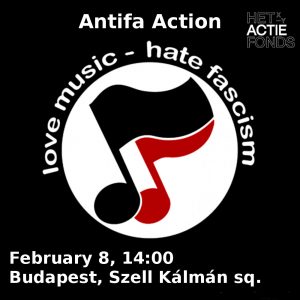
This year February 8 is the 65th occasion of the ‚Day of Honour‘, when the neofascist international movement will hold a multi-day festival in Budapest with concerts and a hike, in which they can merrily organize against all of us who don’t share their views.
Although the ‚break out‘ event they celebrate was forbidden by Hitler himself and was completely pointless from a military standpoint, leaving some twenty thousand widows and orphans as a result, they boast that the soldiers were defending Europe – even though by order they were having the last stand of the remnants of the nazi empire.
This is pure graverobbing and the falsification of history, but for them it’s an excellent opportunity to continue their fight where it ended seventy five years ago after unfathomable misery and sacrifice. Even though according to international, as well as Hungarian law, fascist merry marching is illegal, it’s still expected that they’ll be able to hold some sort of memory service and start their hike anyway.
We would like them NOT to do this uninterrupted, but for them to feel during their programs that Budapest is not a ’safe space‘ for neo-nazis. Therefore we will express our peaceful resistance with loud rhythms and chanting, in order to remind neo-nazis that they are not welcomed to celebrate their ideology openly, especially in the streets and hills of Budapest!
Please, join the an_ti_fa action on February 8 around 2 pm around the Buda castle / Szell Kálmán sq. area to raise your voice against the neo-nazis and show your solidarity and strong stand for peaceful and safe life without hateful ideologies and their adepts!
For more info watch this SPACE.
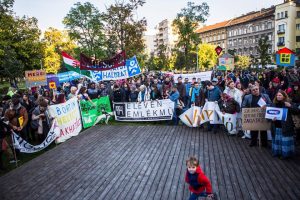
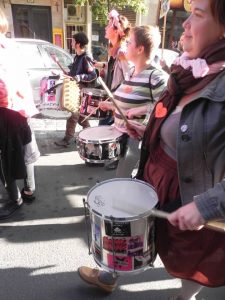
RoR vette részt a AVM 6. Menetben a lakhatáshoz való jogért – Méltó lakhatást mindenkinek! 2016, oktober 8-n.
A Város Mindenkié (AVM) október 8-án szombaton tartotta meg a 6. Menetet a lakhatáshoz való jogért, amin közel ezren vettek részt. Az AVM tagjai, szimpatizánsai – több mint harminc csatlakozó szervezet és helyi közösség – akik vidékről és Budapestről érkeztek, azért vonultak föl, hogy felhívják a figyelmet arra, hogy a lakhatási válság több millió embert érint, és hogy követeljék a kormánytól és a helyi önkormányzatoktól az érdemi lépéseket a lakhatási válság enyhítése érdekében. További információ: http://avarosmindenkie.blog.hu/2016/10/08/mindenkinek_laknia_kell_valaho… További képek: https://www.flickr.com/photos/146232888@N06/albums/72157674841322336
A lakásmenet egy európai szintű mobilizáció része: egész októberben Európa különböző városaiban akciókat szerveznek a hozzánk hasonló lakhatási csoportok a kilakoltatások és a spekuláció ellen. Az Európai Lakhatási Hálózat többi tagjával együtt mi is azt gondoljuk, hogy a városaink nem eladók, és nem hagyjuk, hogy kiszorítsanak minket.
MIÉRT FONTOS, HOGY MINÉL TÖBBEN RÉSZT VEGYÜNK A MENETEN?
Mert MA MAGYARORSZÁGON LAKHATÁSI VÁLSÁG VAN, ami milliókat érint, és ezt meg kell mutatni a döntéshozóknak is!
Mindenkit várunk a tüntetésre, aki szerint elfogadhatatlan, hogy:
– a közelmúltban kb. 30-40%-kal emelkedtek a lakbérek, így ma már szinte lehetetlen megfizethető lakáshoz jutni
– a kevés és drága albérlet nagyon nehézzé teszi, hogy valaki elköltözzön, ami sokszor családon belüli problémákat mélyít el, vagy lehetetlenné teszi, hogy az emberek oda költözzenek, ahol munkalehetőség lenne
– tömegek élnek bizonytalan, illegális bérleti szerződéssel; a mai albérleti helyzet se a tulajdonosoknak, se a bérlőknek nem jó
– a magyarok *átlagosan* a jövedelmük 22%-át költik a lakhatási költségeik fedezésére, és nagyon sokaknak enni is alig marad pénze, miután kifizették a lakhatással kapcsolatos költségeiket
– évente kb. 40 ezer ember tapasztalja meg a hajléktalanságot
– évente több mint ezer családot lakoltatnak ki önkormányzati bérlakásból
– az önkormányzatok folyamatosan adják el a lakásaikat, így még inkább szűkítik a már ma is alig-alig elérhető megfizethető lakhatás lehetőségét
– évente kb. 1 millió ember nem tudja megfelelően fűteni otthonát – ez nemcsak egészségtelen, de veszélyes is
– közel 100 ezer háztartásban kapcsolták ki teljesen a villany-, gáz- vagy távhőszolgáltatást, vagyis ezek a háztartások az alapvető szükségleteiket is alig tudják kielégíteni (pl. főzés, mosás, fűtés)
– közel 150 ezer háztartásnak van 90 napon túli elmaradása jelzálog-hitelével, ami hosszú távon lakásvesztéshez és hajléktalansághoz vezethet
– több, mint 2 millió ember él olyan háztartásban, amelynek lakbér-, lakáshitel- vagy rezsihátraléka van
– 300 ezer ember él szegregált településrészen, sokszor alapvető szolgáltatások nélkül, így még az átlagnál is sokkal rosszabb körülmények között élnek
A Város Mindenkié hisz abban, hogy politikai akarattal a lakhatási válság felszámolható.
KÜZDJ VELÜNK A LAKHATÁSHOZ VALÓ JOGÉRT ÉS A FELELŐS ÁLLAMI ÉS ÖNKORMÁNYZATI LAKÁSPOLITIKÁÉRT!
Követeléseink:
– Ne kelljen éveket várni az önkormányzati lakásokra! Ehhez kiterjedt szociális bérlakás-hálózatot kell kialakítani.
– CSOK helyett lakásfenntartási támogatást! Az állam a lakás használatát, és ne a tulajdonszerzést támogassa.
– Senkit ne lehessen az utcára kirakni! Be kell tiltani az elhelyezés nélküli kilakoltatásokat és olyan szociális és lakásrendszert kell kiépíteni, amely megakadályozza az emberek hajléktalanná válását.
– Ne vegyék el a gyerekeinket! A gyermekek állami gondozásba vétele helyett megfelelő lakáspolitikai támogatást kell nyújtani a kilakoltatással fenyegetett családoknak.
– Nem akarunk évekre szállókon ragadni! A hajléktalanellátó-rendszer teljes átalakítására van szükség, hogy az valóban csak átmeneti megoldás legyen a bajba jutott emberek számára.
– Biztonságos menedéket akarunk! Valódi és elérhető krízisszállásokra van szükség a családon belüli erőszak áldozatainak.
A Város Mindenkié lakáspolitikai követeléseiről itt olvashatsz: http://avarosmindenkie.blog.hu/tags/megoldás
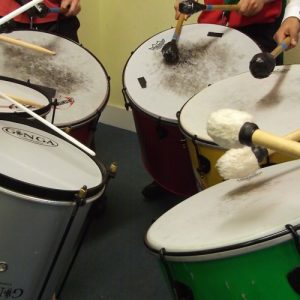
On September 21, 2016, RoR held a beginners‘ workshop that was also a preparation for the upcoming demo: Solidarity with Röszke 11.
There were more people than instruments!!!
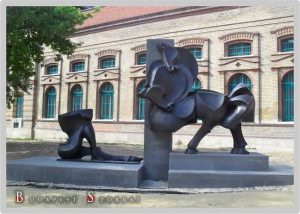
English – below.
Hisytorica-szobor ez a hely, ahol kitűnő alkalom nyílik arra, hogy feltegyük a kérdéseket, amelyeket már biztos ti is feltettetek magatoknak:
Kezdetnek felidézem a jugoszláv feminista, Lidia Sklevicky híres – legalábbis a feministák körében híres kijelentését, a nyolcvanas évekből. Sklevicky gyerekkönyvektől emlékművekig tekintette át történelmi valóságunkat, és azt mondta: több említés esik és több szobor készült lovakról, mint nőkről.
Ez a szobor a Historica címet viseli, de ez lenne a helyes cím: TÖBB LÓ, MINT NŐ. Ez a szobor az itt éppen hiányzó, de mindenütt jelenlévő hőst, a férfit ábrázolja valójában – ennek bizonyítására nézzük meg a felavatási ceremóniát, és máris látni fogjuk, hogy kizárólag férfiak sorakoztak fel itt, annak a két államnak a legmagasabb rangú képviselői, amelyek a szoborprojektben részt vettek, a helyszínt felajánló egyetem képviselői, a projektet finanszírozó cég képviselői – mind férfiak!
Ez az emlékmű – meglehetősen feledhető emlékmű, ami azt illeti – mindazonáltal igen pontosan mutatja a nőknek kijelölt helyet a történelemben és a társadalomban. Ráadásul még szerepeltet egy rabszolgává tett, kihasznált állatalakot is. Az a hierarchikus rend, amit ez az alkotás megmutat, maga a normatív történeti realitás – az, amely a nőket a lovak alá helyezi. Ezért ez egy pontos és normatív ábrázolás, és segít értelmeznünk a tényeket. De felmerülhet a kérdés: ha egy alkotás társadalmilag pontos, akkor mi a baj a normatív ábrázolással? Az a baj vele, hogy nem hagy teret a reflexióra, nincs lehetőség válaszra. Ez nem egy feminista művész munkája, ezt egy férfi készítette, aki már több művében is tárgyiasította a női testet. Hol azért, hogy a női test hidat szimbolizáljon, hol azért, hogy – mint itt – a nő teste felvegye a lehető legpasszívabb pozíciót. Szomorúan teszem hozzá megint: ez lehetne egy realista gesztus is, mely a nők cselekvőkésségtől való megfosztottságát mutatja meg.
E szobor kapcsán egy magas rangú politikus azt mondta: ez a mű “szimbolikus üzenetet hordoz, azt, hogy a kis népek történelme nélkül nincs világtörténelem”. Nyilvánvaló, hogy ezt csak az mondhatja, akinek “kis nép”-komplexusa van. Mi inkább azon gondolkodjunk el, amíg itt állunk, s minket egyáltalán nem csap be a lovas férfiú hiánya: van világtörténelem nők nélkül? Lehetséges? Vajon csak akkor lesz több nő mint ló a történelemben, amikor majd hi-tech atomháborúba keveredünk? Reméljük, hogy nem. Reméljük, hogy nem csak kimozdítjuk a nők igazságtalan és alárendelt pozícióját a történelemben, hanem aktívan hozzájárulunk ahhoz, hogy a fegyverkezés, a háború, és az erőszak minden formája eltűnjön a történelemből.
***
Historica momnument is a place that is incredibly convenient to ask ourselves some questions that I am very sure you have asked yourself already:
to start with the famous, at least to feminists famous statement of Yugoslav feminist Lidia Sklevicky from the eighties on interesting insight into our historical reality, in her case, the one that she tracked down in primary children’s school books and that has lead her to conclude that there are more depictions and mentions of horses than women.
Entitled Historica, this monument would be much more accurately named: MORE HORSES THAN WOMEN. As it is a nice depiction of an seemingly absent but actually omnipresent men/hero – for prove of this we just need to look into the opening ceremony and acknowledge the defile of males in front of it: the highest representatives of the two states involved, the highest representatives of the university that donated the space, the representatives of the company that paid for it – all men! Simultaneously this monument or should I name it microment, shows a position of women in history of a human conflicts but maybe also in society in large, and least but not last it reveals the role, the slavery of non human animals in it.
The evident hierarchy we get depicted here is an exact depiction of the actual historical normative reality, the one that positions women under horses. For this reason alone, this is precisely a normative depiction: the one that sets the norms to representation and interpretation of the facts.
One could for a moment think, so what is the problem with the fact that depiction is normative if it is accurate? The problem is that this reflection is omitted from its representation: this is not a work of a feminist author to start with. This is a work of a man that has repeatedly proved a great skill in objectifying women’s body for various purposes: be it to use a women’s body to symbolize the bridge or like in this depiction here, to show a woman in profoundly passive position. This sadly, is just as well a realistic attempt to once again place women into such position where we make sure we see her robbed of any agency of her own.
This representation led some high political representative to read it as “a symbolic message that there is no world history without a history of small nations”. Having said that, we need to admit this is clearly a statement that only a person with an identity complex of a small nation can figure. What we can instead wonder, standing here, not being tricked by the horsemen’s absence, is more general: is it that there is no human history without women? Is it? Is it that there will be more women than horses in history only when we start looking at the modern weaponry of the atomic hi tech war?
Hopefully not. Hopefully, we can contribute not only to destabilizing this unequal and unjust position of women in history but also to our active contribution to reduction of militarism and all forms of violence in our histories.
Első lépések – First steps
Mintegy fél éves álmodozás, tervezgetés és a bécsi bandához való kiruccanások után végre akcióba lendültünk, s maréknyi lelkes aktivistaként megalapítottuk a Budapesten is a Rhythms of Resistance csoportot.
Október 16-17-én látogatott el hozzánk a bécsi csapat néhány tagja, hogy megtanítsanak nekünk néhány alapritmust. A hétvége során bevezettek minket a hálózat alapgondolatába, az utcai akciók mögött húzódó filozófiába, valamint a közös döntéshozatali technikákba.
Vasárnap már alkalmunk is nyílt mindezt gyakorlatba áthelyezni, közösen csatlakoztunk A város mindenkié! demonstrációhoz.
After half a year of dreaming, planning and little trips to the Vienna group finally we have put our ideas into action and as a group of enthusiastic activists we have created Rhythms of Resistance Budapest. On the weekend of the 16th-17th October some people from the Wienna group have came to teach us some basic rhythms. During the weekend they told us about the basic idea of the ROR network, about the philosophy behind the street actions and they initiated us some basic decision-making techniques. On Sunday we had the opportunity to put everything into action and play on the City is for all demonstration.
Rhythms of Resistance take some of their inspiration from the „blocos-afros“ bands (e.g. Olodum or Ilê Aiyê) that emerged in the mid-1970s in Salvadore, in the Bahia region of Brazil. These bands were formed as expressions of black awareness, in defiance of a military dictatorship which viewed any „cultural“ group as potentially „communist“ and ruthlessly suppressed them. Blocos-afros bands were responsible for blending traditional samba rhythms with reggae, salsa and merengue to create the samba style now known as Samba Reggae. Today many of these bands still campaign for freedom, human rights and equal opportunities, and fight against social injustice and racism
The first Rhythms of Resistance band formed 2000 in London, in reaction against the repression of Reclaim The Streets happenings by the police. Rhythms of Resistance formed as part of the UK Earth First action against the IMF / World Bank in Prague in September 2000. A Pink and Silver carnival bloc, focused around a 55 piece band, detached itself from a march of 67000 and outmanouvered police resources defending the IMF annual summit. With an international ’black bloc’ and a large contingent from the Italian movement, ’Ya Basta’, three diverse forms of direct action worked towards a common goal and resulted in the shut down of the IMF summit. From then on, along with the movement against capitalist globalisation, one group after the other popped up – now we’re all over Europe and occasional in the rest of the world.
Currently, there are bands all over the world
The Rhythms of Resistance (RoR) network of activist samba drum bands comprises more than 30 separate activist samba drum bands all over the world. RoR is descended from the pink and silver „tactical frivolity“ bloc (aka the „silly stunts and fluffy stuff“ section) of the anti-Globalisation campaigns of the 1990s and early 2000s. As such, the use of tactical frivolity, carnival and creativity are a defining hallmark of bands in the RoR network (it is also why many of the bands in the RoR network wear pink when out and about).
All the bands in the RoR network play the same tunes and try and use the same hand signals. This means at large events, different bands can join up to form a large and exuberant bateria.
RoR bands work on a decentralised and democratic basis. All decisions within each band are made by consensus. No-one is „in charge“ and those who have just joined the band have the same voice as those who have been members for many years. Each band operates independently, joining campaigns and actions that they themselves support, but they may join together for national demos etc. At large events, where multiple bands meet up and play together, mestres may come from any of the bands present, swapping in and out as mood and movement takes them.
Although each band in the network is a independent entity answerable only to its members, they all share some common beliefs and values that define the Rhythms of Resistance network as a whole :
We are a transnational anti-hierarchical anticapitalist, antisexist and antiracist network fighting for social and ecological justice.
We are activists using tactical frivolity as a form of political action to confront any system of domination.
We also directly support everybody experiencing or struggling against exploitation, discrimination and oppression, without compromising our principles.
Our tactics include drumming and dancing inspired by samba and carnival.
We reject any false opposition between militancy and creative forms of resistance.
Even if we are different bands operating in a decentralized fashion, we aim to maximise participation in our collective process.
We are an open network to any people who share our principles.
Come with us! We have everything to play for!
More >>HERE
Ha szeretnél nekünk üzenni, csatlakoznál hozzánk, vagy tudsz egy jó demót, ahol dobolhatnánk, küldj egy mailt a rorbudapest (kukac) riseup.net címre.
If you want to send us a message, or join us, or you would like to see us on a demo, please send a mail to rorbudapest (at) riseup.net
A Rhythms of Resistance Budapest egy samba batucada zenét játszó dobos csapat, mely a dobolást politikai demonstrációként használja. 2010 októberében alakult, és a R.o.R. nemzetközi hálózat tagja.
The Rhythms of Resistance Budapest is a drum crew, playing samba batucada as a political action. Founded in october 2010, as a member of the international RoR network.
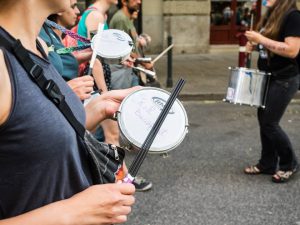
### [for english text, scroll down] ###
### [hungarian translation: Emma] ###
Mi vagyunk az a csapat, akiket tüntetéseken és más akciókon dobolni, skandálni és táncolni szoktatok látni. Szeretnénk ha tudnátok, hogy csodáljuk és értékeljük a munkátokat és szolidaritásunkat fejezzük ki veletek és a mozgalommal.
Örülnénk, ha jobban megismernétek minket, azt hogy kik vagyunk és milyen célokért küzdünk.
A nevünk “Rhythms of Resistance Budapest”; nem vagyunk magyarok, amerikaiak, britek, brazilok vagy bármilyen más nemzetiségűek. Nem igazán szeretjük a nemzeteket vagy államokat, sem bármilyen identitásformát, aminek köze van az emberek közötti határokhoz. Csak azért használjuk az angol nyelvet egymás között, mert ez a legegyszerűbb módja annak, hogy megértsük egymást és másokat. Egyikünk sem az anyanyelvét használja, és ha megkérdezel minket, hogy honnan jövünk, csak azt mondjuk: budapestről.
Ezüst, rózsaszín és más harsány színeket viselünk, mert rikítóak és nevetségesek akarunk lenni. Azt szeretnénk, ha az emberek nevetnének rajtunk és velünk, és együtt jól éreznénk magunkat. De a céljainkat nagyon komolyan vesszük. A zenénket, a színeinket és táncunkat arra használjuk, hogy kifejezzük politikai véleményünket és fellépjünk az elnyomás különböző formái ellen, amelyek a saját és a barátaink életében történnek. A merev és gondterhelt demonstrációkra karneváli hangulatot hozunk, és a zenénk ütemes vibrálása a járókelők figyelmét is könnyen felkelti. Rajtunk keresztül a rendszer elleni dühből ritmus és ellenállás válik. Így leszünk rhythms of resistance!
A horizontalitásban hiszünk: nem támogatjuk a hatalom és a tekintély hierarchikus formáit. Ezért is hiszünk a konszenzus erejében, a szolidaritásban és egymás támogatásában. Nincsenek vezetőink a csapaton belül. Hiszünk az erőszakmentes DE konfrontatív és direkt akciókban. A kreativitásunkat használjuk az akcióink során, és fontosnak tartjuk a csináld-magad elv érvényesülését. Ezért sincsenek szponzoraink, vagy bármi ilyesmi. Nem játszunk politikai pártoknak sem.
Fontos, hogy feminista nézőpontot képviselünk. Erősen ellenzünk minden patriarchális befolyást az akcióinkban. Ilyenek például a már említett nemzeti hovatartozás, hatalmi rendszerek, tekintély és hierarchia. Továbbá elítéljük a nemi szerepeket és azok két csoportra való osztását, a nemi alapú megkülönböztetést. Határozottan elítéljük a szexizmust, a homofóbiát, a transzfóbiát és a nőgyülőletet.
Állj félre és hagyd a női bajtársakat szóhoz jutni!
Nem akarunk olyannak látszani, amilyenek nem vagyunk valójában. Így például felismerjük saját kiváltságainkat, mint állampolgárság, jövedelem, társadalmi osztály és pozíció, társadalmi tőke, végzettség, faji és etnikai hovatartozás. Azok ellen a dolgok ellen küzdünk, amelyek minket személyesen érintenek, de azt is tudjuk, hogy nem járhatunk egy cipőben másokkal. Szolidaritásunkat fejezzük ki a budapesti hajléktalanokkal, romákkal, illegális bevándorlókkal, menedékkérőkkel, és menekültekkel.
Ezeknek a csoportoknak a helyzete eléggé kilátástalan magyarországon. Az állam kriminalizálja azokat, akik nem “igaz magyarok” – ezt minden erőnkkel elítéljük! Felemeljük a hangunkat minden szélsőjobboldali, náci és fasiszta ideológia ellen, ami a politikai pártokból, intézményekből, vagy az utca emberétől érkezik.
Kiállunk a kizsákmányolás minden formája ellen. A régióban budapesten különösen erős a rendőri jelenlét és monitorozás. A rendőrök nem minket szolgálnak, hanem az államot. A rendőrség célja minket kontrollálni. Embereket bebörtönözni: mert szegények, mert nem megfelelő a bőrszínük, vagy a társas viselkedésük nem passzol a normához. Mi mindezekkel az emberekkel szolidaritunk!
Tudjuk, hogy kiváltság az is, hogy emberek vagyunk. A mi társadalmunkban ha bármi más vagy, tárgyként fognak kezelni; megfosztanak a jogaidtól, a tisztességes bánásmódtól és áruként kezelnek. Kiállunk a rossz bánásmód ellen, ami ezeket a barátainkat éri. Az állatok, a nővények és a természet is részei az életünknek,és ami elpusztítja őket, tönkretesz minket is, ha nem harcolunk ellene.
Végül szeretnénk tisztázni, hogy csapatunk nem egy szamba együttes. A zenénk csak egy eszköze a politikai véleménynyilvánításunknak. Egy politikai csoport vagyunk, amelynek megvannak a saját elképzelései és célkitűzései. Ritmusainkkal fel akarjuk rázni a tüntetéseket, amelyekben részt veszünk és hangot akarunk adni az üzeneteinknek.
Tudjuk, hogy a jelenlegi diákmozgalmak szervezői is, hozzánk hasonlóan ellenzik a nacionalista vagy hímsoviniszta viselkedést vagy retorikát. Szeretnénk ha egyre több figyelem irányulna arra, hogy akcióinkban, tüntetéseinkben elkerülhessük ezeket.
Veletek vagyunk!
Találkozunk az utcákon!
### [EN] ###
We are the kids you see playing drums, shouting and dancing in your protests, and in other actions in Budapest. We want to tell you that we admire and appreciate your work and we are in solidarity with you and your movement. But we would like you to know us better, to know who we are and what are we fighting for.
We are called ‘rhythms of resistance budapest’, and we are not hungarian, american, british, brazilian or any other nationality. We don’t really like nations, or states, or any form of identity that has anything to do with borders between people. We only use english language because it’s a convenient way to communicate with each other and with people from other places. None of us uses her or his ‘native’ language. So if you ask us where are we from, we’ll just say ‘budapest’.
We dress in pink and silver and other loud colours because we want to be flashy and ridiculous. We want people to laugh at us, to have fun with us. But we are serious about our goals. We use our music, colours and dances to express our political ideas and to take action against the oppressions that happen in our lives and in our friends’ lives. We bring the idea of carnival to stiff and gloomy demonstrations, and with our rhythms we spread the musical wibes in order to attract the attention of passers-by. We channel the rage against the system into rhythms and resistance!
We stand for horizontality, and we don’t really like any forms of authority. That’s why we believe in consensus, mutual support and solidarity. We do not have any leaders. We believe in non-violent BUT confrontational direct action. We use creativity in our actions, and we strongly believe in do-it-yourself principles. That’s why we have no ‘sponsors’ or stuff like that. And we don’t play for any political party.
It is very important for us that our politics is feminist. We strongly reject any influence of patriarchal structures on our actions. This includes what we already said – nationality, hierarchy and authority. It also includes any ideas about gender roles and divisions, about gender binaries, or about marginalizing someone on the base of their gender. This is why we are strongly against any form of sexism, homophobia, transphobia and misogyny. Step aside, let women comrades speak!
We don’t pretend to be who we’re not, and we recognize our privileges – citizenship, income, class position, social capital, education and race. We fight against what bothers us personally, but we do understand that we cannot walk in anybody else’s shoes. That is why we are in solidarity with the struggles of homeless people, Roma people, illegal immigrants and asylum seekers who live in budapest.
The situation of these groups in hungary is desperate. The institutions of the state make it to be a crime to be anything else than ‘pure’ hungarian. We rise up against this purity! We shout out against any far right, nazi or fascist idea that comes from political parties, institutions of the state, or just people on the street.
Our politics is a fight against any forms of exploitation. budapest is one of the most policed cities in this region. The aim of the police is not to serve us, but to serve the state. The aim of the police is to control us. It is to put people in prisons: people who are poor, who do not have the right skin colour or the right ‘social’ behaviour. We are in solidarity with all these people!
We recognize that we are also privileged to be humans. In our society, to be anything else than human means to be treated as an object; to have no possibility of getting any rights and decent treatment, to be used as a commodity. We stand against the mis-treatment of our non-human friends! Animals, plants and nature are part of our lives, and the same system that destroys them will destroy us, if we don’t fight back.
So in the end we want to make it clear that we are not a samba music band. Music is just a tool for our political ideas. We are a political group, and we have our own ideas and agendas. with our rhythms we strive to stir up and revive any protest/demo we participate in, and be loud about what we stand for. we know that the organizers of the current student movement are similarly opposed to utilizing nationalist and/or male chauvinist rhetoric; we want to call for an increased awareness of how problematic speeches and methods can be avoided within future demonstrations and occupations. we are in solidarity with you!
See you on the streets! We have everything to play for!